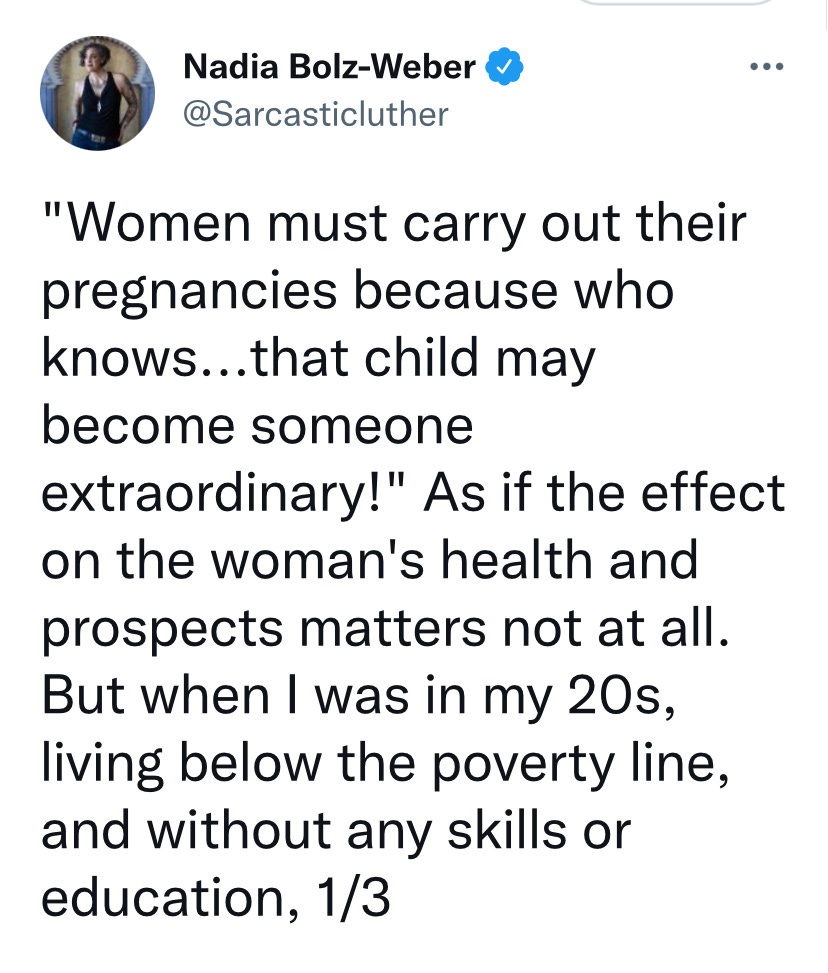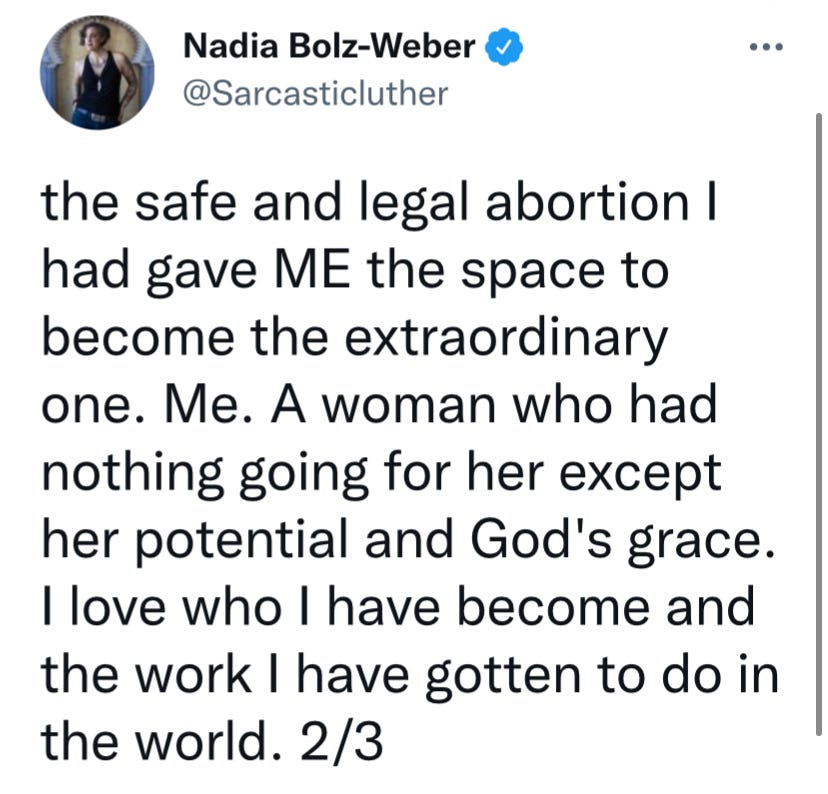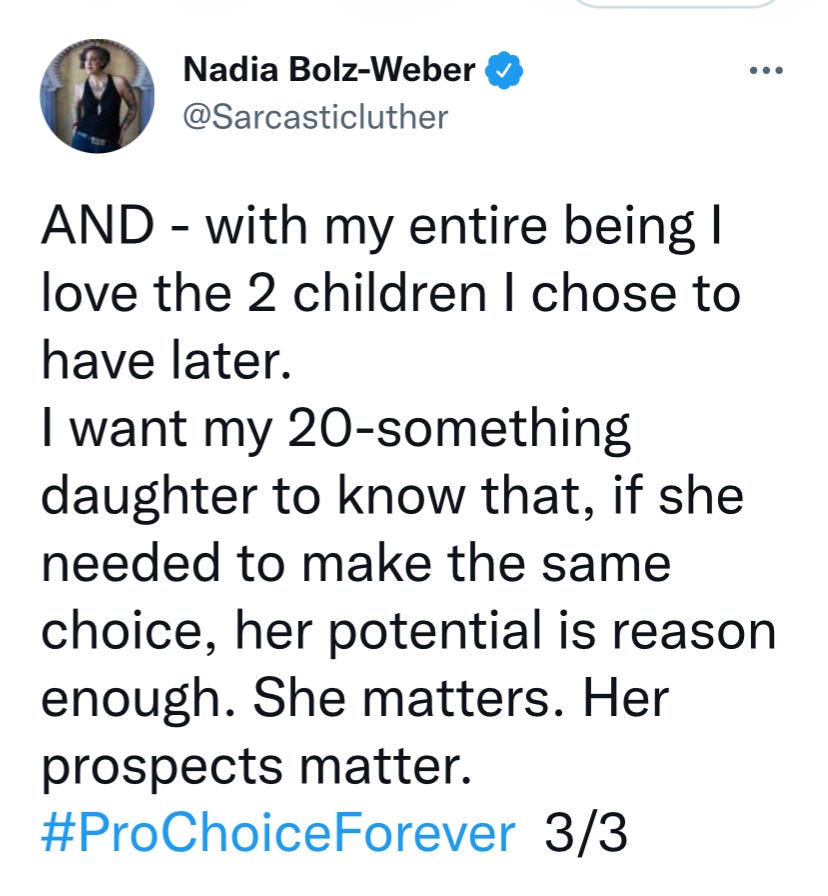#WeToo
When I am asked about why I share so openly about my struggles - about the jagged edges of my own story - I usually say something like, I hope that by being honest I can create a space around me others can step into and feel safer admitting things about themselves - it’s a form of leadership I call “screw it, i’ll go first”.
But, I’m nearly never first first.
In 2017 I read a Twitter post about a woman’s experience with sexual harassment and assault. I cannot remember her name, only that she told her story in such a strong way. Then the same day I saw two other women do the same - soon I realized they were all using a hashtag I’d not seen before, #metoo.
What started as a trickle, soon became a flood. I borrowed courage from these other women and posted my own stories . . . many of you did the same.
But it took the movement of others to get me to move. That’s how it happens sometimes.
I am seeing women go first right now - publicly telling their abortion stories about ectopic pregnancy, bad timing, medical issues, not-being-ready-to-have-a-baby, poverty and abuse. Some for the very first time.
And THIS is where I am finding hope in the midst of this shit we are living through right now.
There’s a reason it was hard to start telling my own story about abortion - mainly because of the vicious shit that is said to me every time I as a Christian publicly speak or write about even being pro-choice.
I mean, there’s a reason people are bullies, right? It’s effective. Bullying creates silence, because we see what you do to those who speak up.
But when we speak as a movement of people, when we speak up together, it’s harder to silence us and it’s easier for the next person to add their own voice, their own story and by doing so, it makes it that much easier for the next person after them.
I know that people of good faith have varying opinions on the issue of abortion. I get that. I honor that. And I do not expect everyone to agree with me. But there is a difference between an opinion and a story. I’ve heard what feels to be all the opinions, what I am so much more interested in, are the stories - personal stories about real life, real bodies, real sorrow, real joy. Thank you for telling yours.
What “the Bible says”
I wanted to share a couple things with you.
1. When I was doing research for my book, Shameless, I collected old Christian sex ed books - including one written by a very conservative Church of Christ doctor who stated this:
I think we know that prior to the Lord putting breath of life into Adam he had a heart, he had a brain with vessels, and these vessels and heart were filled with blood just as the vessels and heart of a fetus are filled with blood. However, Adam did not become a living soul until after the Lord breathed into him the breath of life.
-—Robert L. Pettus Jr., MD, As I See Sex Through the Bible, 1973
This was the overwhelming view of Christians before the advent of the religious right: that the Bible says life begins with breath. What changed, you might ask? Well, not the Bible. What changed is that Evangelicals realized they could have something very delicious: POWER.
There’s a detailed and very disturbing history of this in Shameless - and you can literally see me read the entire thing here for free: https://www.instagram.com/tv/CdJkZeiAof7/?utm_source=ig_web_copy_link
The First Time I Said It In Public
2. I want to share the 2nd half of the chapter, The Rocking Chair from Shameless as it both offers thoughts about life beginning with breath and also tells of the first time I ever publicly told my own abortion story.
The morning after the abortion, I was lying on the thin mattress in the corner of my studio apartment. The mattress came from inside the only other piece of furniture I owned, a small and stained sleeper sofa, which now sank to the ground whenever you sat on it. The couch looked solid, but its insides had been pulled out of it. It was a body made of only skin and air.
My boyfriend, Eric, who’d been caring and affectionate and supportive through all of this, had left moments earlier for his job delivering pizzas. Suddenly, though, there was a knock on my door. I pulled myself up from the mattress. It was my friend Claire, a New Zealander who had overstayed her visa and survived on whatever cash she could make—cooking and sewing and creating all kinds of beauty out of scraps.
“I thought you might need a few things,” she said when I opened the door. She handed me a basket lined with a vintage ladies’ handkerchief and filled with fresh bread, homemade soup, a bar of dark chocolate, and two perfect tangerines.
Claire had visited several times before, so I hadn’t thought to warn her again about the likelihood of being swallowed by my sofa. And so this sweet, nurturing moment of deep friendship was punctuated by Claire’s skinny bum hitting the ground, her knees and torso meeting like two covers of a hardback book.
We broke into the kind of laugh that only people who are sad can manage.
Years later, when Harper was born and I held her, and heard her small breath, it made me think of God. When babies emerge from the blood and oil of their mother’s womb, when their skin touches air for the first time, the chilly shock of it opens their new mouth. And if they are to live, they must pull breath into their tiny lungs, those sacks of delicate wings feathered with blood vessels.
In some Muslim traditions, the very first thing a newborn baby hears is the name of God, whispered into the child’s right ear by their father. I like to think of this as a way of reinforcing whose they are and from whom they came. Perhaps to whisper the name of God to a baby who just emerged from the womb is a way to say that the breath the baby just took is the breath of God, that it is from that very same divine source that the baby has come to us and it is to that divine source the baby will return after the last breath.
Rabbis have long written that the soul enters the body at birth, with the first breath. For breath is the gift of life from the one who created us. From the God who is both our origin and our destination. And in the Hebrew Bible, yhwh (or Yahweh) is the four-letter name of God, too holy to be spoken, which is why instead in our Bibles it simply is replaced with “Lord.”
But some rabbis teach that Yahweh is not even really a word at all. They say it is literally the sound of breath itself, which makes sense, since the closest translation of its meaning is “the One Who Causes to Become.”
“Then the Lord God formed the earthling from the dust of the ground, and breathed into their nostrils the breath of life; and the earthling became a living being” (Genesis 2:7). [Richard Rohr, The Naked Now: Learning to See as the Mystics See (Chicago: Crossroad, 2009), ch. 2.]
Inhale, yah. Exhale, weh. Inhale, yah. Exhale, weh.
I finished writing a draft of this story about pregnancy and babies and my mother’s rocking chair while I was working on the teaching staff at a remote Lutheran retreat center in Washington State. It was summer. Harper would go off to college in the fall, and Judah was about to start a three-year apprenticeship, so we’d taken the opportunity to spend a week together in a place we loved.
When Harper finished reading the draft, she hugged me and nodded knowingly. Then we made our way down the hill from our cabin to the fireside room, where I was about to participate in a weekly faculty forum, a time in which the retreat center’s teaching staff gathered to discuss the wide range of topics we’d talked about in the days prior. About thirty-five folks sat before us to listen and ask questions.
For the next hour, we talked about ecology, liturgy, theology, and the conflict in Northern Ireland. Then, late in the faculty forum, a man in his early seventies spoke up. “There’s only one thing no one mentioned this week, something I feel very strongly about.”
I thought snarkily, You understand that there are a lot of topics in the world, right? Like, we also never mentioned space travel or sea turtles or chicken gizzards.
He continued regardless. “About a million Americans have died in combat since this country was founded. And we have days where we remember them and we honor them.” His wife, who was seated next to him, elbowed him gently in the side, like a warning he chose not to heed.
“But hundreds of thousands of Americans die every year and no one even notices,” he continued. “They are murdered. Murdered in the womb. Why didn’t we talk about that?”
It was fight or flight for me at that point. I located the nearest exit. Had I not taken a moment to pray for help, I would have either walked out of the room or committed aggravated assault on a seventy-year-old man.
Instead, in my most measured voice, I spoke up. “Sir, the fact is, many of us hold a view that Christians and Jews have held for a very, very long time—that based on the creation story in Genesis, life begins with breath. So do not lob your accusations of murder at those whose premise is very different from yours.”
I inhaled as deeply as I could, which wasn’t that deep because I was angry. Then I said something I had never said in public. “And you know what? I had an abortion when I was twenty-four.”
Then I told the story I had written just that day, about how I love babies and that choosing to not have one had destroyed me for a while and yet I never regretted it, because I knew it was the right decision for me.
I looked around the room and noticed the body language of the women, how tense and sad and angry many of them appeared. But I suspected it wasn’t because of what I’d said. I added, “If you were hurt by something said here in this room today, then I am so sorry. And if you have also had an abortion and would like to talk about it, I would love to hear your story.”
I was up until midnight.
A group of women made our way uphill to the dining hall, fixed ourselves toast and cups of herbal tea, and described our anger over the man’s comment. For hours we laughed and drank tea and told our stories about sex and our bodies and pregnancy. It was the best part of the week for me.
As I walked back up to my cabin, another woman approached me, like she’d been waiting until I was free.
“I was twenty,” was all she said.
I gave her a hug and said, “Thanks for telling me.”
She cried, and I waited. “It was twenty-two years ago, and I have never told another person. Not my husband or mom or friends. No one.”
When I asked her why, she simply said, “I guess I never felt invited to.”
I thanked her again, hugged her again, and invited her to maybe think about telling a few more people.
Then I made my way back up the hill and texted my boyfriend back home, told him what had just happened. We’d been together for almost a year by then. We’d been together once before, too, back when I was twenty-four. His name is Eric. He used to deliver pizzas.
Shameless; A Sexual Reformation (2019) by Nadia Bolz-Weber
Copyright - Nadia Bolz-Weber
You may share this post, but the text is not for copy or distribution without consent from author
Here’s a powerful piece by Lisa Sharon Harper about the white evangelical “pro-life” movement from the perspective of a Black woman.
Maybe you are telling your own, tender story for the first time right now, or hearing the stories of those you love and admire. Maybe you are seriously opposed to abortion but think it should still be a safe and legal choice for others and don’t know how to show up for people in your life who are hurting right now. That’s a heavy lift. It’s all a heavy lift, friends.
So please take care of yourselves. Stop doom-scrolling. Maybe go eat some wonderful food and laugh with friends and go outside for walks (or rolls) instead. I will be joining you in this. The road ahead will be long and we need each other.
As always, if you’d like full access to The Corners (exclusive essays, monthly interactive Q and A with me, access to a thoughtful comment section, etc…) but a paid subscription isn’t for you - no problem - just email shamelessmediallc@gmail.com and we will hook you up for FREE.








I am preparing to start a doctorate with Leadership in the title. We are supposed to think about our leadership style. I wonder if “screw it I will go first” is the philosophy I should embrace more?
I can’t tell you how grateful I am that you are in the world and that you have the courage to share so many of your stories. Every time I read your words, whether they are your books or here at The Corners, I feel less alone. I’m also starting to have a sliver of hope that God and I can find each other. Thank you. ❤️